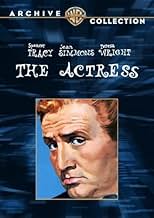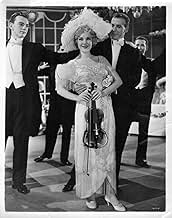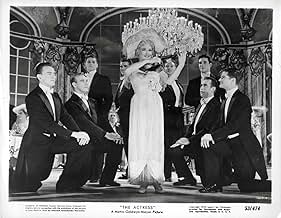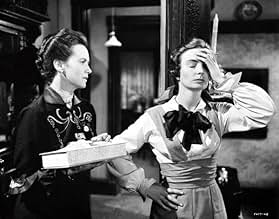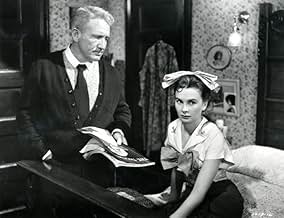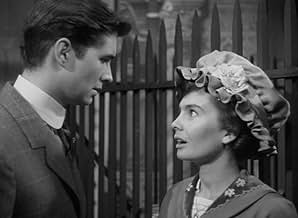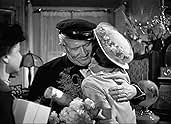AVALIAÇÃO DA IMDb
6,4/10
1,6 mil
SUA AVALIAÇÃO
Adicionar um enredo no seu idiomaThis is an account of the real life experience of actress/playwright Ruth Gordon.This is an account of the real life experience of actress/playwright Ruth Gordon.This is an account of the real life experience of actress/playwright Ruth Gordon.
- Indicado a 1 Oscar
- 2 vitórias e 3 indicações no total
Erville Alderson
- Mike McGrath
- (não creditado)
Hal Bell
- Chorus Boy in 'The Pink Lady'
- (não creditado)
Jackie Coogan
- Inopportune
- (não creditado)
Ken DuMain
- Spectator at Show
- (não creditado)
James Elsegood
- Chorus Boy in 'The Pink Lady'
- (não creditado)
Adolph Faylauer
- Spectator at Show
- (não creditado)
Raoul Freeman
- Spectator at Show
- (não creditado)
Robert Fuller
- Dancer
- (não creditado)
Ed Fury
- Dance Partner
- (não creditado)
Avaliações em destaque
Set in 1913 New England, seventeen-year-old Ruth Gordon Jones (Jean Simmons) decides on a stage career at about the same time her father decides to send her to the Boston Physical Culture Institute to become a PE teacher. His inspiration is Emma Glavey (Mary Wickes).
Despite its title, "The Actress" (1953) is really Ruth Gordon's loving tribute to her parents; written at a time when she could look back and really appreciate them. It is based on a stage play she wrote and then adapted to the screen. Although primarily known today (because of a couple of cult films) for her acting, Gordon was an excellent writer of both plays and screenplays.
If you are looking for spectacular sets and exciting action adventure, "The Actress" is not the film for you. But if you are looking for some of the best dialogue out there and what is arguably Spencer Tracy's most amusing performance you should make it a point to track this down.
Gordon obviously got her love of performing from her father Clinton (played by Tracy), a one-time sailor with a gift for gab and a desire to pontificate and be the center of attention. The conflict in the story is not so much over her desire to become an actress, but between the tendency of both father and daughter to be overly dramatic. They tend to get on each other's nerves with the mother Annie (Teresa Wright) caught in the middle. Only the mother picks up on how alike father and daughter actually are, the old acorn never falls far from the tree thing.
Much of what Clinton says is too original not to have been invented by the author. My favorite is a lengthy piece about the family's grocery bills during which Clinton complains that Ruth is too lazy to walk to a nearby farm for three pounds of butter. Annie excuses her daughter's inactivity by citing her bad back. A little later when he notices that Annie has been buying expensive tangerines instead of oranges for Ruth's school lunch, he speculates that carrying the lighter tangerine is easier on her back.
Although Wright is a little young for her role, her uncanny resemblance to Gordon (some believed that she was actually Gordon's daughter) made casting her as Gordon's mother a nice inside joke.
This production is extremely funny and has a lot of charm. They go out on a cool shot of the cat on windowsill eating a plant; with the family visible through the window heading off to the railroad station.
Then again, what do I know? I'm only a child.
Despite its title, "The Actress" (1953) is really Ruth Gordon's loving tribute to her parents; written at a time when she could look back and really appreciate them. It is based on a stage play she wrote and then adapted to the screen. Although primarily known today (because of a couple of cult films) for her acting, Gordon was an excellent writer of both plays and screenplays.
If you are looking for spectacular sets and exciting action adventure, "The Actress" is not the film for you. But if you are looking for some of the best dialogue out there and what is arguably Spencer Tracy's most amusing performance you should make it a point to track this down.
Gordon obviously got her love of performing from her father Clinton (played by Tracy), a one-time sailor with a gift for gab and a desire to pontificate and be the center of attention. The conflict in the story is not so much over her desire to become an actress, but between the tendency of both father and daughter to be overly dramatic. They tend to get on each other's nerves with the mother Annie (Teresa Wright) caught in the middle. Only the mother picks up on how alike father and daughter actually are, the old acorn never falls far from the tree thing.
Much of what Clinton says is too original not to have been invented by the author. My favorite is a lengthy piece about the family's grocery bills during which Clinton complains that Ruth is too lazy to walk to a nearby farm for three pounds of butter. Annie excuses her daughter's inactivity by citing her bad back. A little later when he notices that Annie has been buying expensive tangerines instead of oranges for Ruth's school lunch, he speculates that carrying the lighter tangerine is easier on her back.
Although Wright is a little young for her role, her uncanny resemblance to Gordon (some believed that she was actually Gordon's daughter) made casting her as Gordon's mother a nice inside joke.
This production is extremely funny and has a lot of charm. They go out on a cool shot of the cat on windowsill eating a plant; with the family visible through the window heading off to the railroad station.
Then again, what do I know? I'm only a child.
Ruth Gordon's play Years Ago, a sentimental reminiscence along the lines of Kathryn Forbes' Mama's Bank Account, looked at her stage-struck adolescence. In 1953, it became a movie, The Actress, directed by George Cukor, with the rarefied and mannered Jean Simmons taking the part of the straight-shooting Gordon. Oddly enough, the main character is not the aspiring actress but her father, played by Spencer Tracy.
In Clinton Jones, Gordon penned a difficult but irresistible character. Settled unarguably into middle age but still fighting it, he chafes at his $37.50-a-week salary (it was 1913) and pores over the grocery list while his wife (Teresa Wright) defends such frivolities as tangerines. A former sea captain, he latches onto any opportune ears like the Ancient Mariner and spins his salty yarns of ports of call on the seven seas. In the dead of a New England winter, he insists on sleeping in a hammock strung on an upstairs porch. The ham in Tracy rises to the challenge, and he manages to make Jones recklessly funny while still a bit frightening (near the end, details of his dreadful boyhood emerge to put his cantankerousness in focus).
As screenwriters, Gordon and her husband Garson Kanin custom-tailored many screen vehicles for Tracy and co-star Katharine Hepburn, where their relationship is said to take the writers' marriage as its model; here Tracy returns the favor by making Gordon's father so unforgettable. Gordon pays a tribute, too, by sketching her character not as she remembered it but as he must have seen her, showing little talent or wit but a penchant for dreaming up castles in Spain. By hiding her own bright light under a bushel, she lets the memory of her father shine.
In Clinton Jones, Gordon penned a difficult but irresistible character. Settled unarguably into middle age but still fighting it, he chafes at his $37.50-a-week salary (it was 1913) and pores over the grocery list while his wife (Teresa Wright) defends such frivolities as tangerines. A former sea captain, he latches onto any opportune ears like the Ancient Mariner and spins his salty yarns of ports of call on the seven seas. In the dead of a New England winter, he insists on sleeping in a hammock strung on an upstairs porch. The ham in Tracy rises to the challenge, and he manages to make Jones recklessly funny while still a bit frightening (near the end, details of his dreadful boyhood emerge to put his cantankerousness in focus).
As screenwriters, Gordon and her husband Garson Kanin custom-tailored many screen vehicles for Tracy and co-star Katharine Hepburn, where their relationship is said to take the writers' marriage as its model; here Tracy returns the favor by making Gordon's father so unforgettable. Gordon pays a tribute, too, by sketching her character not as she remembered it but as he must have seen her, showing little talent or wit but a penchant for dreaming up castles in Spain. By hiding her own bright light under a bushel, she lets the memory of her father shine.
This movie is so much more than a sentimental reminiscence. I'm not much at all for those "I remember..." mom or dad or whatever memory movies. Also, there are so many, many plays and movies about a family's career aspirations for a son, aspirations that get challenged because of what the son wants to do instead. Here we have a story set after the turn of the 20th century, about a working class father's career aspirations for his DAUGHTER - a career that will provide her with financial stability but isn't at all what she wants to do. Spencer Tracy plays a curmudgeon, working-class, not-at-all refined father in a role I've never seen him in before - and he's AMAZING. The dialogue has some one linters that are, at times, hysterical - any person who has every been embarrassed by their parents, or every had a parent say something like, "Why did you ever have to be so different?" will warm to this movie immediately. And the Mary Wickes moment is why she makes every movie better even if she's in it for less than 20 seconds.
10rfkeser
Delightful turn-of-the-century comedy captures the silly, head-in-the-clouds flush of adolescence. Dreaming of the glamour and magic of the theatre, small-town romantic Jean Simmons waltzes around the decidedly earthbound household of her Papa: grizzled, opinionated sea-captain Spencer Tracy, who spends his time resisting the coming of the telephone. Anthony Perkins makes a charming screen debut as her beau in a raccoon coat [although the actor preferred to downplay it]. Director George Cukor lavishes warmth and affectionate detail on Ruth Gordon's fine script as he guides the cast through some of the most satisfying ensemble playing on the screen.
"The Actress" is Jean Simmons playing the great Ruth Gordon herself (real name Ruth Gordon Jones) in this 1953 film also starring Spencer Tracy, Teresa Wright, and Anthony Perkins. Simmons is out of her teen years but not by much - she was 24 - and manages to pull off being a 17-year-old who falls in love with theater after seeing Hazel Dawn in "The Pink Lady." Determined to become an actress, she writes to Ms. Dawn and when Hazel answers, Ruth is heady with excitement. This doesn't sit well with her beau (Perkins) or her mother (Wright) - and it wouldn't sit well with her irascible father either, except that he knows nothing about it. Yet.
The Massachusetts family home is lovingly depicted here, complete with a cat that is supposedly a big nuisance to all of them - Clinton Jones (Tracy) complains about him constantly, as he complains about everything, but yet has taught the cat a couple of tricks. You can see he's one of the family and that Clinton isn't as tough as he appears to be. The excellent Wright has what is often the maternal role in a family - that of go-between. And for the time being, she advises Ruth to keep her mouth shut. The funniest scene in the film is Clinton showing off his athletics with his group at the YMCU - he's a riot as his daughter squirms in embarrassment.
This is not a big movie; it's one about a short girl who desperately wants to be on the stage. As I was one of those teens once, I can say that the acting and directing capture this perfectly. Simmons is clearly a girl who can't be dissuaded by any negativity and who sees her goal as the only thing that matters, and it's one of pure bliss. She has no sense of limitation or reality - nor should she at that age. Time gives us that soon enough. It was a brave step in those days to refuse a marriage proposal and want to go off to a city to live on your own. Ruth Gordon did it and made good.
It's clear from the story how much Gordon loved her parents and how proud she was of her beginnings. She is one whose dreams came true, even if she had to wait until the age of 72 to become a movie star. There was plenty of a marvelous stage and writing career before that. "The Actress" shows us where it all began.
The Massachusetts family home is lovingly depicted here, complete with a cat that is supposedly a big nuisance to all of them - Clinton Jones (Tracy) complains about him constantly, as he complains about everything, but yet has taught the cat a couple of tricks. You can see he's one of the family and that Clinton isn't as tough as he appears to be. The excellent Wright has what is often the maternal role in a family - that of go-between. And for the time being, she advises Ruth to keep her mouth shut. The funniest scene in the film is Clinton showing off his athletics with his group at the YMCU - he's a riot as his daughter squirms in embarrassment.
This is not a big movie; it's one about a short girl who desperately wants to be on the stage. As I was one of those teens once, I can say that the acting and directing capture this perfectly. Simmons is clearly a girl who can't be dissuaded by any negativity and who sees her goal as the only thing that matters, and it's one of pure bliss. She has no sense of limitation or reality - nor should she at that age. Time gives us that soon enough. It was a brave step in those days to refuse a marriage proposal and want to go off to a city to live on your own. Ruth Gordon did it and made good.
It's clear from the story how much Gordon loved her parents and how proud she was of her beginnings. She is one whose dreams came true, even if she had to wait until the age of 72 to become a movie star. There was plenty of a marvelous stage and writing career before that. "The Actress" shows us where it all began.
Você sabia?
- CuriosidadesFilm debut of Anthony Perkins.
- Erros de gravaçãoIn a scene late in the film, set in the kitchen, the light fixture over the kitchen table is seen (and heard!) to rise up to allow the camera to pass below it.
- Citações
Annie Jones: Ruth, why don't you give up this going on the stage business and settle down with a nice man?
Ruth Gordon Jones: Oh, mama, don't be disgusting!
- Cenas durante ou pós-créditosOpening credits are shown over the cover of a photo album, and the film begins by showing us various photos from inside the album.
- ConexõesFeatured in The Men Who Made the Movies: George Cukor (1973)
- Trilhas sonorasSilent Night, Holy Night
(1818) (uncredited)
Music by Franz Xaver Gruber
In the score for photo album pictures
Principais escolhas
Faça login para avaliar e ver a lista de recomendações personalizadas
- How long is The Actress?Fornecido pela Alexa
Detalhes
Bilheteria
- Orçamento
- US$ 1.424.000 (estimativa)
- Tempo de duração
- 1 h 30 min(90 min)
- Cor
- Proporção
- 1.37 : 1
Contribua para esta página
Sugerir uma alteração ou adicionar conteúdo ausente



